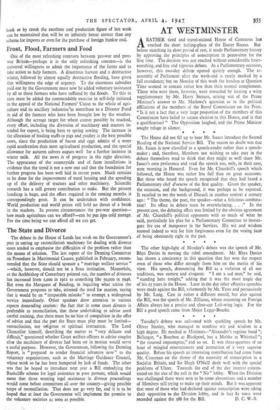The State and Divorce
The debate in the House of Lords last week on the Government's part in setting up reconciliation machinery for dealing with divorce cases tended to emphasise the difficulties of the problem rather than the means of solution. The last report of the Denning Committee on Procedure in Matrimonial Causes, published in February, recom- mended that the State should sponsor a "marriage welfare service" ‚ÄĒwhich, however, should not be a State institution. Meanwhile, as the Archbishop of Canterbury pointed out, the number of divorces has increased from t,000 in 19n to something like 50,000 in 1946. But even the Marquess of Reading, in inquiring what action the Government proposes to take, stressed the need for caution, saying that it would be an "irreparable mistake" to attempt a widespread service immediately. Other speakers drew attention to various aspects demanding caution: the fact that in some cases divorce is preferable to reconciliation, that those undertaking to advise need careful training, that there must be no hint of compulsion in the offer of advice and that the part the State must play must be limited‚ÄĒ reconciliation, not religious or spiritual instruction. The Lord Chancellor himself, describing the matter as "very delicate and difficult," questioned whether Court welfare officers to advise couples after the machinery of divorce had been set in motion would serve a useful purpose. However, the Government, following the Denning Report, is "prepared to render financial advances now" to the voluntary organisations, such as the Marriage Guidance Coone-il, whose work so far has been hampered by lack of funds. The other was that he hoped to introduce next year a Bill embodying the Rushdiffe scheme for legal assistance to poor persons, which would mean that those wanting legal assistance in divorce proceedings would come before committees all over the country‚ÄĒgiving possible scope of reconciliation. That does not go very far, and it is to be hoped that at least the Government will implement the promise to the voluntary societies as soon as possible.


































 Previous page
Previous page